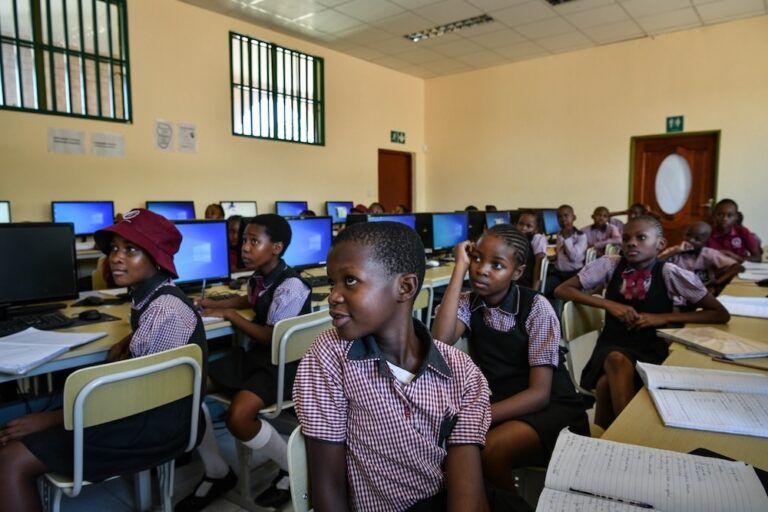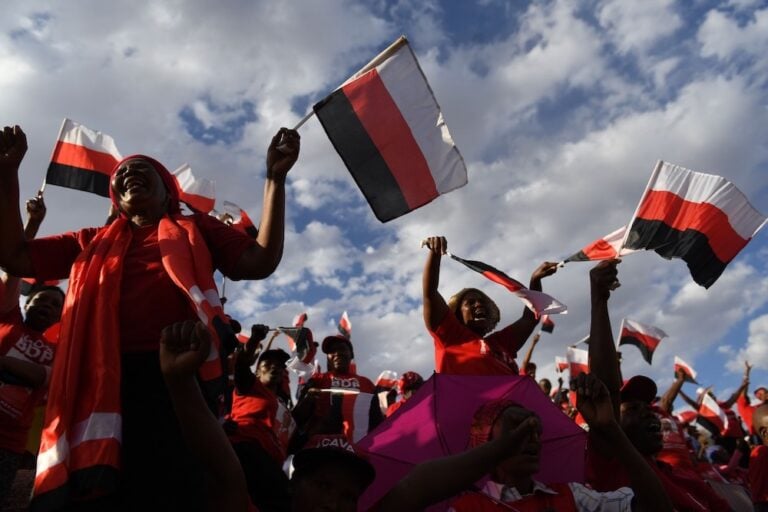(MISA/IFEX) – The following is a joint action by 28 IFEX members: His Excellency the President of Botswana Lt Gen Ian Khama Seretse Khama Office of the President P/Bag 001 Gaborone Tel: +267 3950800 Fax: +267 3191786 Dear Mr. President, Ref: Appeal on the Media Practitioners Act We, the undersigned freedom of expression organisations, make […]
(MISA/IFEX) – The following is a joint action by 28 IFEX members:
His Excellency the President of Botswana
Lt Gen Ian Khama Seretse Khama
Office of the President
P/Bag 001 Gaborone
Tel: +267 3950800
Fax: +267 3191786
Dear Mr. President,
Ref: Appeal on the Media Practitioners Act
We, the undersigned freedom of expression organisations, make reference to the above matter and hereby appeal to your office and that of the Ministry of Communication, Science and Technology to review the Media Practitioners Act passed by Parliament on 11 December 2008 and assented to by the Executive on 31 December.
We join the Media Institute of Southern Africa (MISA) in expressing our concern that the Media Practitioners Act is a threat to the rights and free operations and existence of the media in Botswana.
While the law says it is aimed at preserving media freedom, upholding standards of professional conduct and promoting ethical standards and discipline, these good intentions are undermined by many sections of the law which we believe restrict media work and have the effect of cowing media practitioners into fear and self censorship.
We raise particular concern with the setting up, composition and duties of the Media Council and its mandate to monitor journalists, administer accreditation and impose an outside regulatory system on the media. It is troubling that this media council will in fact be appointed by the Minister without any stated criteria for the participation of media practitioners and organisations, which have been relegated to membership and associate membership roles.
While the act states that the Media Council shall be independent, this is not supported by any clause in the act. The council will be financed by government and the councillors wholly appointed by the Minister. Thus, the council cannot, by its very nature, be independent. This is further compounded by the fact that the Government itself is a media owner. This raises fears that the law is aimed at the private media.
We call attention to the provisions allowing for the Media Council to monitor the activities of journalists, which are vague and open to abuse. These provisions cast a shadow of fear and self-censorship over the profession, stifling investigative journalism and other critical reporting that is essential to addressing social issues and curbing corruption.
Under these circumstances, the Media Council is in our view assuming quasi-judicial powers – a role that is best left to the courts. By setting up a council to preside over media misdemeanours the government is criminalising the profession of journalism. We condemn the inclusion of punitive fines and jail terms of up to three years that are outlined in this legislation and call on your government to decriminalise all press offences, which are better dealt with through self-regulation by the profession.
The accreditation scheme laid out under the act is problematic for several reasons. Without stating the intentions behind the provisions on accreditation the law remains vague and open to interpretation. The criteria for accreditation are not outlined nor are the powers of the Media Council in this respect.
It concerns us that the law provides for the Media Council, rather than employers or media owners, to determine who can work as a journalist in Botswana. The lack of clarity in the legislation leaves open the possibility that the Media Council could actually deny a journalist accreditation. Thus the accreditation scheme outlined is really a form of licensing journalists.
The law also fails to make clear whether failure to seek accreditation would be considered a punishable violation under these provisions or whether accreditation is automatic once one proves oneself to be a bona fide journalist.
Finally, this law does not take into consideration the current context of media plurality. Beyond professional journalists, citizens themselves are engaging in the information sector through various new technologies and through other independent or community-based forms of mass media. Since the law does not recognise other forms of media it creates barriers to free expression for citizens as well as journalists and media outlets.
We appeal to your government to review the Act in line with principles of freedom of expression enunciated in many regional and international documents, including the Declaration of Principles on Freedom of Expression in Africa, adopted by the African Commission on Human and Peoples’ Rights at its 32nd Session, 17 – 23 October 2002. Note that article 9, clause 3 of the declaration states that: “Effective self-regulation is the best system for promoting high standards in the media”.
We hope that this appeal will receive attention from your government as part of strengthening democratic rule in Botswana.
Sincerely,
Adil Soz, International Foundation for Protection of Freedom of Speech, Kazakhstan
Arabic Network for Human Rights Information (ANHRI), Egypt
Associação Brasileira de Jornalismo Investigativo (ABRAJI), Brazil
Bahrain Center for Human Rights (BCHR), Manama
Canadian Journalists for Free Expression (CJFE), Canada
Cartoonists Rights Network, International (CRNI), U.S.A.
Center for Media Freedom and Responsibility (CMFR), The Philippines
Center for Media Studies and Peace Building (CEMESP), Liberia
Committee to Protect Journalists (CPJ), U.S.A.
Freedom House, U.S.A.
Free Media Movement (FMM), Sri Lanka
Independent Journalism Center (IJC), Moldova
Index on Censorship, U.K.
Instituto Prensa y Sociedad (IPYS), Venezuela
International Federation of Journalists (IFJ), Belgium
International Press Institute (IPI), Austria
Journaliste en Danger (JED), Democratic Republic of Congo
Media, Entertainment and Arts Alliance (MEAA), Australia
Media Foundation for West Africa (MFWA), Ghana
Media Institute of Southern Africa, Namibia
Media Rights Agenda (MRA), Nigeria
Media Watch, Bangladesh
Mizzima News, India/Burma
Observatoire pour la liberté de presse, d’édition et de creation (OLPEC), Tunisia
Reporters sans frontières (RSF), France
World Association of Community Radio Broadcasters (AMARC), Canada
World Association of Newspapers (WAN), France
World Press Freedom Committee (WPFC), U.S.A


